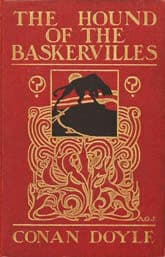The Hound of the Baskervilles
Critique • Quotes • Sherlock Holmes at the movies
 First edition
First editionFirst publication
1902
Literature form
Novel
Genres
Mystery, crime
Writing language
English
Author's country
England
Length
Approx. 58,500 words
Holmes confronts the horror
First thing you have to do is forget all the movie and television productions you might have seen of this tale.
Those misty, moody scenes on the moors.... The horror of the hound from hell, eyes blazing as it attacks its terrified victims.... The haunted heir in the mansion and his enigmatic neighbours....
True, all this comes from the pen of Arthur Conan Doyle as he wrote The Hound of the Baskervilles, his most successful detective novel, and the narrative that most easily translates to cinematic treatment. Doyle establishes an atmosphere of mystery here that goes beyond the usual presentation and solution of a puzzle. Like the stories of Edgar Allen Poe, this detective story becomes literature.
All right, we're getting a little carried away. This is still an escapist thriller. And the spine-tingliness of it may not faze a modern public weaned on Stephen King novels and slasher films.
But if you can put out of mind our more jaded world and imagine yourself back in late nineteenth-century or early twentieth-century England, you may be able to read The Hound of the Baskervilles with something like the excitement folks did back then.
There's also the theme of rationalism going up against, and defeating, the paranormal—which Doyle did not emulate in his own life. But an odd thing about The Hound of the Baskervilles is how little of Holmes's reasoning is displayed in the novel.
In fact, for much of the story Watson is the protagonist, having been sent by Holmes to Devon to investigate the goings-on with the Baskervilles. Partly, we understand this is a literary device to allow the lesser detecting partner to present us the mystery in all its details and then allow the greater to make a thrilling appearance and solve the mystery.
More suspense
But there may be other factors at work here. The Hound of the Baskervilles was written nearly a decade after Doyle had killed off his popular hero at the Reichenbach Falls. Bowing to relentless public pressure for more Holmes, the author gets around the death by situating Hound in an earlier time. But he may still have been reluctant to have the novel completely absorbed with the figure he thought was stealing public appreciation from what he considered his more important works.
The result is a greater attention paid to details of setting and atmosphere, as well as a greater buildup of suspense in Hound, than in works that have Sherlock involved from the beginning.
And when the conclusion comes—with that damnably charismatic character back at the centre—it is all the more effective.
I'm not sure this is lasting literature. (Though how many other popular novels from 100 years ago are still being read today?) But if I had to pick the pre-World War I genre novel that had the best chance of becoming a mainstream classic, this would be the one.
Indubitably.
— Eric
Critique • Quotes • Sherlock Holmes at the movies

